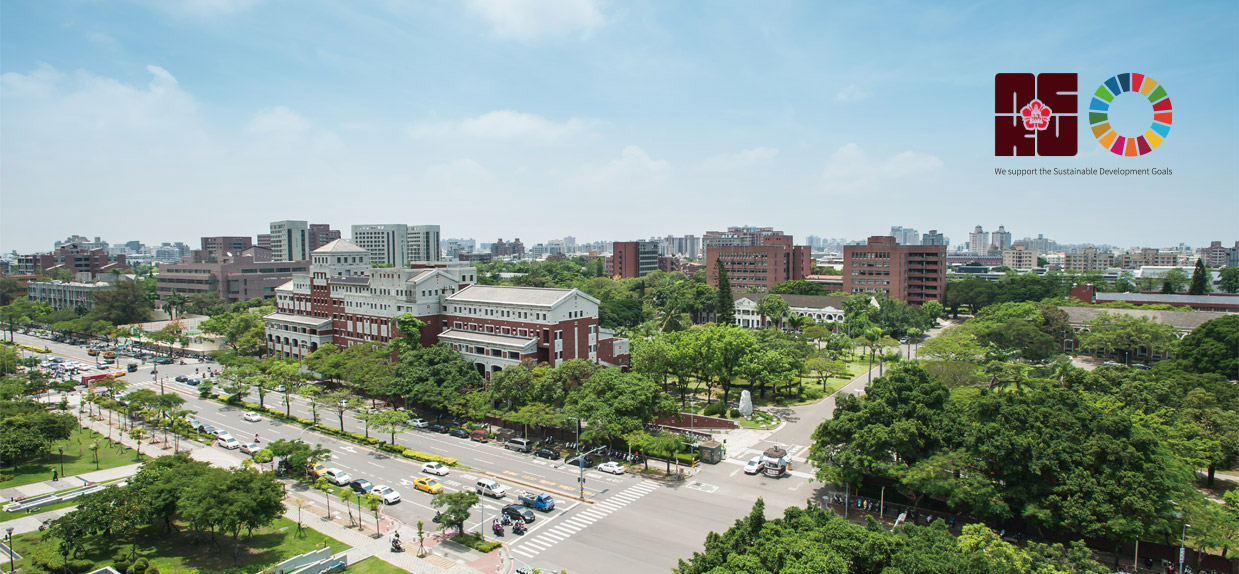NCKU reducing marine pollution (policy)
National Cheng Kung University (NCKU) advances campus sustainability through concrete policies and innovative research. To support Taiwan’s “Marine Waste Management Action Plan,” NCKU has issued Plastic Reduction Guidelines that prohibit the provision or use of single-use plastic products in campus meetings and administrative events, reducing land-based sources of marine pollution. The university also sets strict drainage quality standards for dormitories and laboratories. Clear definitions and disposal procedures for hazardous laboratory materials ensure that solid and liquid waste is properly treated, protecting water quality and preventing contamination of nearby water bodies.
Beyond policy, NCKU plays a leading role in green technology. Researcher Jun-Yen Chen of the Biotechnology Center is a pioneer in microalgae studies in Taiwan. He and his team have built one of the most comprehensive domestic microalgae genetic databases and established Asia’s largest outdoor demonstration plant for microalgae cultivation. By integrating algae–bacteria biotechnology, they develop systems that simultaneously treat wastewater and capture carbon, directly contributing to net-zero carbon reduction goals.
Chen’s work has been recognized and supported by the National Science and Technology Council’s Value Creation Program and has attracted close to NT$100 million in investment from a major petrochemical company, highlighting its industrial potential. In response to global pressure to achieve net-zero emissions by 2050, his team continues to expand microalgae-based carbon reduction and resource-reuse technologies. They are exploring high-value applications such as sustainable fuels and low-carbon materials, positioning NCKU as a key force in linking academic research, industrial innovation, and environmental stewardship.
- NCKU Plastic Reduction Guidelines

NCKU has published the "NCKU Plastic Reduction Guidelines," in order to align with the Taiwanese government's "Taiwan Marine Waste Management Action Plan." These guidelines explicitly stipulate that single-use plastic products shall not be provided or used during campus meetings and administrative activities, aiming to reduce the pollution of marine life caused by land-based activities.
- NCKU Regulations for Wastewater Management in Buildings and Laboratories

Furthermore, NCKU has provided guidance and specifications for drainage quality in school dormitories and laboratories. In particular, there are clear definitions and regulated disposal methods for laboratory hazardous materials, ensuring that the disposal of solid and liquid laboratory waste does not adversely affect the water quality and avoids contaminating nearby bodies of water.
- Waste liquid classification steps of laboratory, published by Center for Occupational Safety and Health and Environmental Protection

NCKU has provided guidance and specifications for drainage quality in school dormitories and laboratories. In particular, there are clear definitions and regulated disposal methods for laboratory hazardous materials, ensuring that the disposal of solid and liquid laboratory waste does not adversely affect the water quality and avoids contaminating nearby bodies of water.
-
Research Team of Researcher Jun-Yen Chen, NCKU: Innovative Circular Economy Industry for High-Efficiency Conversion of Livestock and Industrial Wastewater
 Researcher Jun-Yen Chen from the Biotechnology Center at National Cheng Kung University has long been dedicated to microalgae research and is regarded as a pioneer in this field in Taiwan. He led his team to establish one of the most comprehensive local microalgae genetic databases in Taiwan’s academic community, as well as Asia’s largest outdoor microalgae cultivation demonstration plant. By applying innovative integrated algae-bacteria biotechnology, his team works on wastewater treatment and carbon capture, actively advancing net-zero carbon reduction efforts.His research has not only received funding support from the National Science and Technology Council’s Value Creation Program but has also gradually built strong industry collaborations. Moreover, it has attracted nearly NT$100 million in investment from a leading domestic petrochemical corporation, positioning his work as a highly anticipated emerging carbon-reduction technology.
Researcher Jun-Yen Chen from the Biotechnology Center at National Cheng Kung University has long been dedicated to microalgae research and is regarded as a pioneer in this field in Taiwan. He led his team to establish one of the most comprehensive local microalgae genetic databases in Taiwan’s academic community, as well as Asia’s largest outdoor microalgae cultivation demonstration plant. By applying innovative integrated algae-bacteria biotechnology, his team works on wastewater treatment and carbon capture, actively advancing net-zero carbon reduction efforts.His research has not only received funding support from the National Science and Technology Council’s Value Creation Program but has also gradually built strong industry collaborations. Moreover, it has attracted nearly NT$100 million in investment from a leading domestic petrochemical corporation, positioning his work as a highly anticipated emerging carbon-reduction technology.
Amid the global pressure to achieve net-zero emissions by 2050, Chen is further devoted to microalgae-based carbon reduction and resource reuse, while also pursuing high-value applications to drive the development of sustainable fuels and low-carbon materials.






